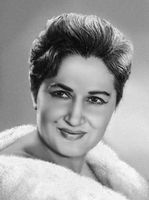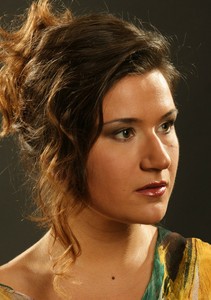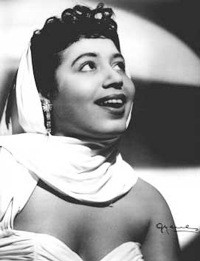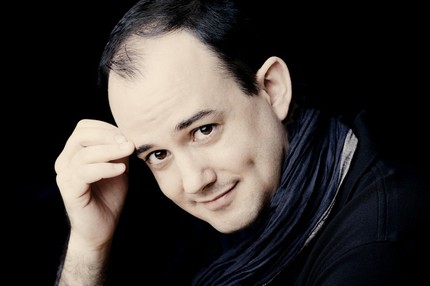
Irina Konstantinovna Arkhipova |
Irina Arkhipova
Here are just a few excerpts from a huge number of articles on Arkhipova:
“Arkhipova’s voice is technically honed to perfection. It sounds amazingly even from the lowest to the highest note. The ideal vocal position gives it an incomparable metallic sheen, which helps even phrases sung pianissimo to rush over a raging orchestra ”(Finnish newspaper Kansanuutiset, 1967).
“The incredible brilliance of the singer’s voice, its endlessly changing color, its undulating flexibility …” (American newspaper Columbus Citizen Journal, 1969).
“Montserrat Caballe and Irina Arkhipova are beyond any competition! They are one and only of their kind. Thanks to the festival in Orange, we had the good fortune to see both great goddesses of modern opera in the Il trovatore at once, always meeting with an enthusiastic reception from the public ”(French newspaper Combat, 1972).
Irina Konstantinovna Arkhipova was born on January 2, 1925 in Moscow. Irina was not yet nine years old when her hearing, memory, sense of rhythm opened the doors of the school at the Moscow Conservatory for her.
“I still remember some special atmosphere that reigned in the conservatory, even the people we met were somehow significant, beautiful,” recalls Arkhipova. – We were received by a noble-looking lady with a luxurious (as I then imagined) hairdo. At the audition, as expected, I was asked to sing something to test my musical ear. What could I sing then, I am a child of my time of industrialization and collectivization? I said that I would sing “The Tractor Song”! Then I was asked to sing something else, like a familiar excerpt from an opera. I could do this because I knew some of them: my mother often sang popular opera arias or excerpts that were broadcast on the radio. And I suggested: “I will sing the choir of “Girls-beauties, darlings-girlfriends” from “Eugene Onegin””. This suggestion of mine was received more favorably than the Tractor Song. Then they checked my sense of rhythm, musical memory. I also answered other questions.
When the audition was over, we were left to wait for the results of the test. That beautiful female teacher came out to us, who struck me with her magnificent hair, and told dad that I was accepted into the school. Then she confessed to dad that when he talked about his daughter’s musical abilities, insisting on listening, she took it for the usual parental exaggeration and was glad that she was wrong, and dad was right.
They immediately bought me a Schroeder piano… But I didn’t have to study at the music school at the conservatory. On the day on which my first lesson with a teacher was scheduled, I fell seriously ill – I was lying with a high temperature, catching a cold (along with my mother and brother) in line at the Hall of Columns during farewell to S.M. Kirov. And it began – a hospital, complications after scarlet fever … Music lessons were out of the question, after a long illness I barely had the strength to make up for what was missed in a regular school.
But dad did not give up his dream of giving me an initial musical education, and the question of music lessons arose again. Since it was too late for me to start piano lessons at a music school (they were accepted there at the age of six or seven), my dad was advised to invite a private teacher who would “catch up” with me in the school curriculum and prepare me for admission. My first piano teacher was Olga Alexandrovna Golubeva, with whom I studied for over a year. At that time, Rita Troitskaya, the future mother of the now famous singer Natalya Troitskaya, studied with her with me. Subsequently, Rita became a professional pianist.
Olga Alexandrovna advised my father to take me not to the conservatory school, but to the Gnesins, where I had more chances to be accepted. We went with him to the Dog’s playground, where the Gnesins’ school and school were then located … “.
Elena Fabianovna Gnesina, after listening to the young pianist, sent her to her sister’s class. Excellent musicality, good hands helped to “jump” from the fourth grade straight to the sixth.
“For the first time, I learned an assessment of my voice in a solfeggio lesson from a teacher P.G. Kozlov. We sang the task, but someone from our group was out of tune. To check who is doing this, Pavel Gennadievich asked each student to sing separately. It was my turn too. From embarrassment and fear that I had to sing alone, I literally cringed. Although I sang intonation cleanly, I was so worried that my voice sounded not like a child, but almost like an adult. The teacher began to listen attentively and with interest. The boys, who also heard something unusual in my voice, laughed: “Finally they found the fake one.” But Pavel Gennadievich abruptly interrupted their fun: “You are laughing in vain! Because she has a voice! Maybe she will be a famous singer.”
The outbreak of war prevented the girl from completing her studies. Since Arkhipova’s father was not drafted into the army, the family was evacuated to Tashkent. There, Irina graduated from high school and entered the branch of the Moscow Architectural Institute, which had just opened in the city.
She successfully completed two courses and only in 1944 returned to Moscow with her family. Arkhipova continued to actively participate in the institute’s amateur performances, without even thinking about a career as a singer.
The singer recalls:
“At the Moscow Conservatory, senior students have the opportunity to try their hand at pedagogy – to study in their specialty with everyone. The same restless Kisa Lebedeva persuaded me to go to this sector of student practice. I “got” the student vocalist Raya Loseva, who studied with Professor N.I. Speransky. She had a very good voice, but so far there was no clear idea about vocal pedagogy: basically she tried to explain everything to me using the example of her voice or those works that she performed herself. But Raya treated our studies conscientiously, and at first everything seemed to be going well.
One day she took me to her professor to show me the results of working with me. When I started to sing, he came out of the other room, where he was then, and asked in surprise: “Who is this singing?” Paradise, confused, not knowing what exactly N.I. Speransky pointed to me: “She sings.” The professor approved: “Good.” Then Raya proudly announced: “This is my student.” But then, when I had to sing at the exam, I could not please her. In class, she talked so much about some techniques that were in no way consistent with my usual singing and were alien to me, she spoke so incomprehensibly about breathing that I was completely confused. I was so worried, so constrained in the exam, that I could not show anything. After that, Raya Loseva told my mother: “What should I do? Ira is a musical girl, but she cannot sing.” Of course, it was unpleasant for my mother to hear this, and I generally lost faith in my vocal abilities. Faith in myself was revived in me by Nadezhda Matveevna Malysheva. It is from the moment of our meeting that I count my biography of the singer. In the vocal circle of the Architectural Institute, I learned the basic techniques of correct voice setting, it was there that my singing apparatus was formed. And it is to Nadezhda Matveevna that I owe what I have achieved.”
Malysheva and took the girl to an audition at the Moscow Conservatory. The opinion of the conservatory professors was unanimous: Arkhipova should enter the vocal department. Leaving work in the design workshop, she completely devotes herself to music.
In the summer of 1946, after much hesitation, Arkhipova applied to the conservatory. During the exams in the first round, she was heard by the famous vocal teacher S. Savransky. He decided to take the applicant into his class. Under his guidance, Arkhipova improved her singing technique and already in her second year she made her debut in the performance of the Opera Studio. She sang the role of Larina in Tchaikovsky’s opera Eugene Onegin. She was followed by the role of Spring in Rimsky-Korsakov’s The Snow Maiden, after which Arkhipova was invited to perform on the radio.
Arkhipova moves to the full-time department of the conservatory and begins to work on the diploma program. Her performance in the Small Hall of the Conservatory was rated by the examination committee with the highest score. Arkhipova was offered to stay at the conservatory and was recommended for admission to graduate school.
However, at that time, a teaching career did not attract Arkhipova. She wanted to be a singer and, on the advice of Savransky, decides to join the trainee group of the Bolshoi Theater. But failure awaited her. Then the young singer left for Sverdlovsk, where she was immediately accepted into the troupe. Her debut took place two weeks after her arrival. Arkhipova performed the role of Lyubasha in the opera by N.A. Rimsky-Korsakov “The Tsar’s Bride”. Her partner was the famous opera singer Yu. Gulyaev.
Here is how he remembers this time:
“The very first meeting with Irina Arkhipova was a revelation for me. It happened in Sverdlovsk. I was still a student at the conservatory and performed in small parts on the stage of the Sverdlovsk Opera Theater as a trainee. And suddenly a rumor spread, a new young, talented singer was accepted into the troupe, who was already being talked about as a master. She was immediately offered a debut – Lyubasha in Rimsky-Korsakov’s The Tsar’s Bride. She was probably very worried … Later, Irina Konstantinovna told me that she turned away from the posters with fear, where it was first printed: “Lyubasha – Arkhipova.” And here is Irina’s first rehearsal. There were no scenery, there were no spectators. There was only a chair on the stage. But there was an orchestra and a conductor at the podium. And there was Irina – Lyubasha. Tall, slender, in a modest blouse and skirt, without a stage costume, without makeup. Aspiring singer…
I was backstage five meters from her. Everything was ordinary, in a working way, the first rough rehearsal. The conductor showed the introduction. And from the very first sound of the singer’s voice, everything changed, came to life and spoke. She sang “This is what I have lived to, Grigory,” and it was such a sigh, drawn out and aching, it was such a truth that I forgot about everything; it was a confession and a story, it was a revelation of a naked heart, poisoned by bitterness and suffering. In her severity and inner restraint, in her ability to master the colors of her voice with the help of the most concise means, there lived an absolute confidence that excited, shocked and surprised. I believed her in everything. Word, sound, appearance – everything spoke in rich Russian. I forgot that this is an opera, that this is a stage, that this is a rehearsal and there will be a performance in a few days. It was life itself. It was like that state when it seems that a person is off the ground, such inspiration when you sympathize and empathize with the truth itself. “Here she is, Mother Russia, how she sings, how she takes the heart,” I thought then … “
While working in Sverdlovsk, the young singer expanded her operatic repertoire and improved her vocal and artistic technique. A year later, she became a laureate of the International Vocal Competition in Warsaw. Returning from there, Arkhipova made her debut in the classical part for mezzo-soprano in the opera Carmen. It was this party that became the turning point in her biography.
After playing the role of Carmen, Arkhipova was invited to the troupe of the Maly Opera Theater in Leningrad. However, she never made it to Leningrad, because at the same time she received an order to be transferred to the troupe of the Bolshoi Theater. She was noticed by the chief conductor of the theater A. Melik-Pashayev. He was working on updating the production of the opera Carmen and needed a new performer.
And on April 1, 1956, the singer made her debut on the stage of the Bolshoi Theater in Carmen. Arkhipova worked on the stage of the Bolshoi Theater for forty years and performed in almost all parts of the classical repertoire.
In the first years of her work, her mentor was Melik-Pashayev, and then the famous opera director V. Nebolsin. After a triumphant premiere in Moscow, Arkhipova was invited to the Warsaw Opera, and from that time her fame began on the world opera stage.
In 1959, Arkhipova was the partner of the famous singer Mario Del Monaco, who was invited to Moscow to play the role of José. After the performance, the famous artist, in turn, invited Arkhipova to participate in productions of this opera in Naples and Rome. Arkhipova became the first Russian singer to join foreign opera companies.
“Irina Arkhipova,” said her Italian colleague, “is exactly the Carmen that I see this image, bright, strong, whole, far from any touch of vulgarity and vulgarity, humane. Irina Arkhipova has a temperament, a subtle stage intuition, a charming appearance, and, of course, an excellent voice – a mezzo-soprano of a wide range, which she is fluent in. She is a wonderful partner. Her meaningful, emotional acting, her truthful, expressive conveyance of the depth of the image of Carmen gave me, as the performer of the role of José, everything that was needed for the life of my hero on stage. She is a truly great actress. The psychological truth of the behavior and feelings of her heroine, organically connected with music and singing, passing through her personality, fills her entire being.
In the 1959/60 season, together with Mario Del Monaco, Arkhipova performed in Naples, Rome and other cities. She received great reviews from the press:
“… A true triumph fell to the lot of the soloist of the Moscow Bolshoi Theater Irina Arkhipova, who performed as Carmen. The strong, wide range, rare beauty voice of the artist, dominating the orchestra, is her obedient instrument; with his help, the singer was able to express a whole range of feelings that Bizet endowed the heroine of his opera with. The perfect diction and plasticity of the word should be emphasized, which is especially noticeable in recitatives. No less than Arkhipova’s vocal mastery is her outstanding acting talent, distinguished by her excellent elaboration of the role down to the smallest details ”(Zhiche Warsaw newspaper of December 12, 1957).
“We have many enthusiastic memories of the performers of the main role in Bizet’s amazing opera, but after listening to the last Carmen, we can say with confidence that none of them aroused such admiration as Arkhipova. Her interpretation for us, who have opera in their blood, seemed completely new. Exceptionally faithful Russian Carmen in an Italian production, to be honest, we did not expect to see. Irina Arkhipova in yesterday’s performance opened up new performing horizons for the character of Merimee – Bizet ”(Il Paese newspaper, January 15, 1961).
Arkhipova was sent to Italy not alone, but accompanied by an interpreter, a teacher of the Italian language Y. Volkov. Apparently, the officials were afraid that Arkhipova would remain in Italy. A few months later, Volkov became Arkhipova’s husband.
Like other singers, Arkhipova often fell victim to behind-the-scenes intrigues. Sometimes the singer was simply refused to leave under the pretext that she had too many invitations from different countries. So one day, when Arkhipova received an invitation from England to participate in the production of the opera Il Trovatore on the stage of the Covent Garden Theatre, the Ministry of Culture replied that Arkhipova was busy and offered to send another singer.
The expansion of the repertoire caused no less difficulties. In particular, Arkhipova became famous for her performance of European sacred music. However, for a long time she could not include Russian sacred music in her repertoire. Only in the late 80s did the situation change. Fortunately, these “accompanying circumstances” have remained in the distant past.
“The performing art of Arkhipova cannot be placed within the framework of any role. The circle of her interests is very wide and diverse, – writes V.V. Timokhin. – Along with the opera house, a huge place in her artistic life is occupied by concert activity in its most diverse aspects: these are performances with the Bolshoi Theater Violin Ensemble, and participation in concert performances of opera works, and such a relatively rare form of performance today as Opernabend ( evening of opera music) with a symphony orchestra, and concert programs accompanied by an organ. And on the eve of the 30th anniversary of the Victory of the Soviet people in the Great Patriotic War, Irina Arkhipova appeared before the audience as a magnificent performer of the Soviet song, masterfully conveying her lyrical warmth and high citizenship.
The stylistic and emotional versatility inherent in Arkhipova’s art is unusually impressive. On the stage of the Bolshoi Theater, she sang virtually the entire repertoire intended for mezzo-soprano – Marfa in Khovanshchina, Marina Mnishek in Boris Godunov, Lyubava in Sadko, Lyubasha in The Tsar’s Bride, Love in Mazepa, Carmen in Bizet, Azucenu in Il trovatore, Eboli in Don Carlos. For the singer, who conducts systematic concert activity, it became natural to turn to the works of Bach and Handel, Liszt and Schubert, Glinka and Dargomyzhsky, Mussorgsky and Tchaikovsky, Rachmaninov and Prokofiev. How many artists have to their credit romances by Medtner, Taneyev, Shaporin, or such a wonderful work by Brahms as Rhapsody for mezzo-soprano with male choir and symphony orchestra? How many music lovers were familiar with, say, Tchaikovsky’s vocal duets before Irina Arkhipova recorded them on a record in an ensemble with soloists of the Bolshoi Theater Makvala Kasrashvili, as well as with Vladislav Pashinsky?
Concluding her book in 1996, Irina Konstantinovna wrote:
“… In the intervals between tours, which are an indispensable condition for an active creative life, recording the next record, or rather, a CD, filming television programs, press conferences and interviews, introducing singers at the concerts of the Singing Biennale. Moscow – St. Petersburg”, work with students, work in the International Union of Musical Figures … And more work on the book, and more … And …
I myself am surprised how, with all my downright crazy workload of pedagogical, organizational, social and other “non-vocal” affairs, I still continue to sing. Just like that joke about the tailor who was elected king, but he does not want to give up his craft and sews a little more at night …
Here you go! Another phone call… “What? Ask to organize a master class? When?.. And where should I perform?.. How? Is the recording already tomorrow? .. “
The music of life continues to sound … And it’s wonderful.





